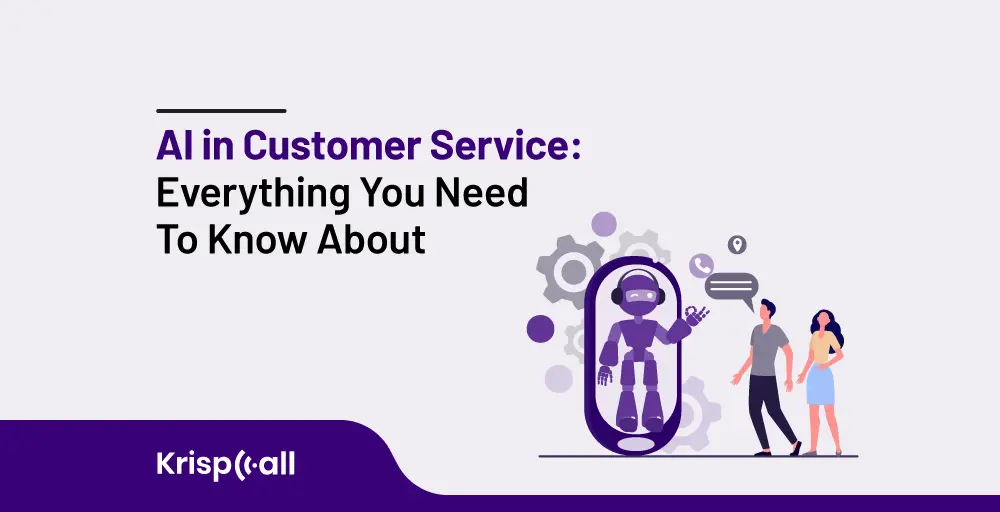Have you ever wondered how some businesses are so good at customer service? 🤔
The answer is simple–Artificial Intelligence (AI). 🤖
With AI in customer service, businesses can quickly and accurately respond to many customer questions. It has made customer services faster, more efficient, and more personalized than ever before. It can transform how businesses offer their services to their customers.
In this blog, we’ll explore AI in customer service, its benefits, the ways to incorporate it into customer services, and its future trends in customer service.
🔐 KEY HIGHLIGHTS
- AI in customer service is crucial to optimize the level of services provided to the clients prior to, during, and after their purchase.
- Integrating AI in customer service helps handle large volumes of datas, reduces average handling time, personalizes experience, etc.
- AI can be used in customer service for human customer service, email inquiries, call management, voice recognition for product support, and more.
- The things to consider while implementing AI in customer service are its impact on the workforce, trust and reliability issues, investment and implementation, etc.
- The incorporation of AI comes with challenges, such as the cost of implementation, training AI on specific models, and long implementation lead times.
What is AI in customer service?
AI in customer service is the use of AI to optimize the level of services provided to clients prior to, during, and after their purchase. It includes artificial intelligence in different areas like chatbots, customer services, virtual assistants, or even automated replies to customer queries.

By integrating AI in the support services sector, business organizations can deliver more accurate, quicker, and round-the-clock services to customers. This will automatically enhance organizational performance.
It comprises some important features, such as the use of chatbots and virtual assistants. These are useful for continuous customer service, automated responses, and intelligent suggestions based on the customer’s information record.
Moreover, it also assists in performing sentiment analysis, predictive analysis, and multichannel integration for managing customer interaction in an efficient manner.
Benefits of AI in customer service
AI helps to improve customer service tasks, optimize the work processes, and enhance the productivity of the employees. The major benefits businesses can attain by incorporating AI in customer services are:
1. Handle large volumes of data.
AI instantly processes large quantities of information about customers and presents their advantages which are not easy to notice for the company. By applying AI, businesses can affect data mining from several customer contacts. It converts unstructured data into a specific type of knowledge and recognizes recurring patterns in customers’ behaviors.
Likewise, it also identifies trends within the market and the potential problems. Overall, it assists in making efficient decisions which can further provide an uplift in customer service approaches.
2. Reduce average handling times (AHT)
With the AI implementation, such as chatbots and voice biometrics, the businesses can streamline customer interactions, leading to a decrease in Average Handling Time (AHT). The chatbots offer instant responses reducing wait times and dissatisfied customers.
Moreover, voice biometrics also helps significantly reduce the user verification time, enabling faster issue resolution. Overall, it improves efficiency in customer service operations.
3. Personalize experiences and offerings
Implementing chatbots and voice biometrics can further improve the customer experience and preferences. AI can analyze customer feedback and behavior, thus providing recommended responses relevant to their needs. Chatbots are a way to provide fast, individual help and support to customers in real-time.
Whereas, voice biometrics means individual, fast, and seamless identification of customers. This persona as an installation improves customer satisfaction and loyalty and, hence better overall customer service performance.
4. Track and improve support quality
Quality management with the help of artificial intelligence makes it easier for a team to monitor the quality of support and constantly enhance team and agent performance. Customer service results can be viewed on a daily/weekly/monthly basis. These scores of clients and recommendations can be beneficial for coaching and development.
By using AI, it becomes possible to monitor key performance indicators and determine where improvements could be made to customer support services. It also put in place an action plan to enhance the level of service being offered.
10 Ways to use AI in customer service
There are many ways one can incorporate AI in customer service and attain optimum benefits. Some of the ways businesses can incorporate AI in their customer service process are:
1. AI-supported human customer service
When AI is combined with human agents there is a faster and more efficient delivery of customer services. AI performs basic tasks such as case handling and call distribution, thereby enabling human personnel to tackle complicated inquiries and build long-term connections.
Automated customer service, fast access to data, and customer routing can all be aided by AI, thus enhancing the efficiency of human services. It also results in improvements in customer service since customers are attended to – by specialists who handle the services they are using.
2. AI-organized email inquiries
If all the emails that a company receives were to be managed and understood solely by people, it would take a lot of time. So, this is where AI-organized email inquiries comes in place. It works by linking emails and categorizing them so that they can be forwarded to the respective department within no time. It offers solutions that have been employed by the firm in the past when interacting with clients.
Thus, agents spend more time on valuable messages and filter out spam and promotional letters. Nevertheless, with the help of AI, email tools enhance the speed and personalize customer support by responding to their messages quickly and on time.
3. Visual recognition for product support
These systems then quickly analyze images or videos in a bid to understand various product-related challenges. The complexity of this advanced technology has made customers use some signs that will help in a more systematic and fast diagnosis. Customers are able to learn when problems are specifically related to them through the use of accurate recognition algorithms.
It also provides guidance on how to solve such problems using visuals. This not only improves the customers’ situation and their experience with the product or service but also eliminates the need for long blocks of description in order to receive help.
4. AI-enhanced call management
AI implementation within voice communications can be difficult due to factors like noise, accents, and bad pronunciation. But it is still worthwhile to do so because call centers still offer the most effective way to manage these complicated customer problems.
The use of technologies such as speech analytics and other technologies can make call centers smooth and efficient by making call center agents perform well. This results in efficient management of the call and enhanced satisfaction of the customers.
5. Assisting with agent onboarding and training
AI is quite essential when it comes to simplifying agent onboarding and training processes. Take for example AI-driven virtual assistants; they possess the capability to simulate actual customer interactions hence assisting new agents in practicing how to deal with different scenarios within a given space.
Similarly, instant feedback on agent performance during virtual training can show where various improvements can be made.
6. Offering multilingual support
Technological advancement in AI technologies makes it possible for customer service software to include language processing features for businesses to support customers from different regions. AI-powered chatbots and voice-based virtual assistants can help support teams reach out to customers in their desired language, irrespective of the distance.
Not only does this capability facilitate meeting the needs of customers through eliminating language barriers but also it enables customer questions to be answered within the shortest time and correctly.
7. Creating powerful intelligent workflows
Customer service software powered by AI gives support teams the ability to develop smart workflows that simplify customer service jobs. Customer service agents could concentrate on solving difficult issues and supplying customized support services by automating regular operations and applying AI-driven analysis to this case.
Similarly, an optimized workflow that boosts productivity as well as customer satisfaction can be attained when using such tools because it makes their response times faster than ever before allowing them to help effectively without delays while handling inquiries from clients.
👉 Also Read: Best AI Productivity Tools To Enhance Workflow
8. Gathering consumer insights
Customer service software nowadays is leveraging AI to provide businesses with deep insights into their consumers. Through analyzing reviews and customer interaction data, companies can really get to know their customers.
By using AI-friendly algorithms, support teams are able to understand customer preferences and attitudes better. This knowledge helps them make informed decisions about performance and tailor services to meet individual needs, ultimately ensuring customer satisfaction and building loyalty.
9. Delivering personalized support
AI-powered customer service software enables support teams to offer customers personalized support experiences. Customer service agents could deliver customized recommendations and guidance to customers using their data and machine learning algorithms.
Similarly, this form of personalization not only boosts satisfaction levels among consumers but also creates loyalty and strengthens relationships between clients and the company.
10. Enhancing self-service options
Customer service applications powered by artificial intelligence improve customer self-sufficiency, enabling them to seek solutions to their inquiries by themselves. With the help of AI-based knowledge management systems and virtual advisors, clients can get the needed material and instructions.
Moreover, this self-service capability not only enhances customer satisfaction by enabling customers to solve their issues independently but also lightens the load on the support teams.
What are the things to consider when implementing AI in customer service?
Implementing AI involves different complexity and technical issues. Therefore, several factors need to be considered before integrating it into your business system.
Here are the lists of some factors that need to be considered:
1. Impact on the workforce
AI integration into customer service needs to take into account the effect it has on employees. A lack of AI knowledge may result in a skill gap in customer service agents. Also, people in the services sector are likely to be concerned by the idea of AI taking over their positions.
To eliminate these concerns, it is crucial to explain how they will upskill through the AI system while keeping in mind the need for the human element to create extraordinary customer experiences.
2. Trust and reliability issues
When companies are deploying AI for customer service, some of the essential aspects that must be taken into account include trust and reliability. For now, AI frequently uses uncurrent information and has certain issues regarding its accuracy while working with complex questions or confidential data.
Privacy and trust issues are especially sensitive and should be well protected regarding business and customer data. This is a challenge that can be solved by grounding AI in trusted CRM data and knowledge bases in order to gain customers’ trust.
3. Investment and implementation
AI in customer service primarily encompasses investment and implementation. If you opt for growing the AI independent of the software you use, or using customer service software with built-in AI, it may cost money in technology and training. 💰
Small businesses or organizations may struggle to fund the adoption of AI solutions or may not have enough resources to effectively integrate AI into their operation.
Challenges of AI in customer service
Although you have gained certain insights into how AI can transform the customer services of businesses, it is equally important to know the challenges it incorporates.
Some challenges of AI in customer service are;
Cost of implementing AI
The use of AI in customer service calls for a significant investment in both time and money when done on a large scale. This is due to various factors, such as the type of AI, the solution’s sophistication level, and the business’s size.
However, outsourcing solutions make the incorporation of AI affordable, thus making changes such as improving efficiency, balancing staff work, etc. There are other tools and features, such as AI bots and machine learning, that offer fast value delivery with AI tools.
Training AI on specific models
One of the main issues of customer service is training AI on specific models. This process often takes a considerable amount of time to complete as it may take hours to properly set up to ensure that the correct response to customer inquiries is provided.
However, modern AI tools are designed with built-in customer intent models and natural language understanding that address challenges in industries like retail, software, or financial services. This saves businesses time and money by enabling them to gain such benefits as soon as possible without many arrangements.
Long lead times to implement
One major difficulty is that AI implementation in customer service requires long lead times. If not solved with the right AI partner, the process could take longer. It takes months to plan, test, and finally implement.
However, with the right tools, implementing AI is easy and quick. It can be set up in as little as minutes and does not require developers or much IT assistance. This allows businesses to integrate AI rapidly in all processes and equip agents with easy-to-use instruments in one interface.
Future Trends in AI Customer Service
The advancements in the sector of Artificial Intelligence are growing at a faster pace, and customer service is expected to benefit in the future as well. Self-service applications are another trend today, especially given the ability to make use cases beyond the contact center.
The predictive component of generative AI in the sector of service management will enhance the frontline customer service teams. It provides them with crucial customer, asset, and service history information to assist them in more efficient operations while involving them in analysis-related assignments and natural language processing.
As more companies implement and integrate AI customer service tools, customer service teams stand to gain from features and solutions such as work summaries and knowledge articles, among others, that tend to improve work efficiency and outcomes.
Conclusion
AI in customer service helps to optimize the level of services provided to the customers. It helps to handle large volumes of datas, reduce average handling times, personalize experiences, and improve support quality. Businesses can use AI to support customer support agents, organize email inquiries, manage calls, and more.
Despite all these boons, integrating AI customer service software presents different challenges. These challenges include the cost of implementation, training-specific models, longer implementation lead times, etc.





